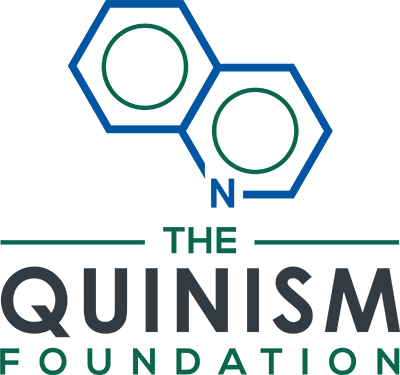The Quinism Foundation in the News
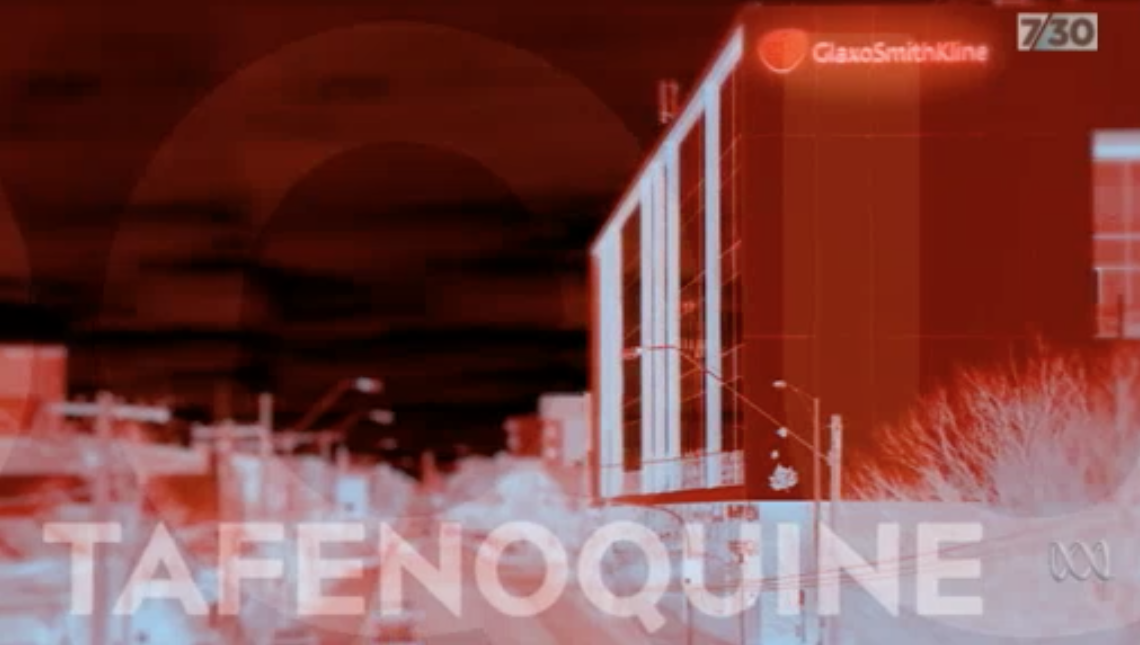
The Quinism Foundation is Featured in This Australian Broadcasting Corporation Report on Tafenoquine
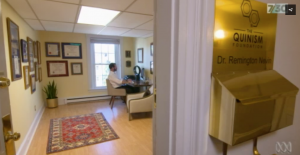 The Quinism Foundation’s executive director, Dr. Nevin, was featured in a recent story on tafenoquine by the Australian Broadcasting Corporation that was broadcast on their show 7:30. You can watch the entire nine-minute broadcast, featuring scenes from The Quinism Foundation’s home in White River Junction, Vermont, and interviews with surviving members of the mefloquine and tafenoquine drug trials conducted by the Australian military.
The Quinism Foundation’s executive director, Dr. Nevin, was featured in a recent story on tafenoquine by the Australian Broadcasting Corporation that was broadcast on their show 7:30. You can watch the entire nine-minute broadcast, featuring scenes from The Quinism Foundation’s home in White River Junction, Vermont, and interviews with surviving members of the mefloquine and tafenoquine drug trials conducted by the Australian military.
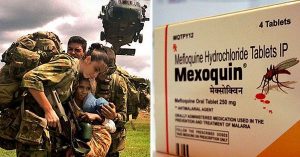 Executive director Dr. Nevin was also recently featured in two posts in the fightmalaria blog, including this five-minute audio interview commenting on safety concerns related to tafenoquine, and this short feature discussing broader concerns with mefloquine and tafenoquine, “The Malaria Drugs with Devastating Side Effects“. The Quinism Foundation appreciate’s this blog’s continuing coverage of the concerns of the drug safety advocacy community and is looking forward to continued engagement with this media outlet.
Executive director Dr. Nevin was also recently featured in two posts in the fightmalaria blog, including this five-minute audio interview commenting on safety concerns related to tafenoquine, and this short feature discussing broader concerns with mefloquine and tafenoquine, “The Malaria Drugs with Devastating Side Effects“. The Quinism Foundation appreciate’s this blog’s continuing coverage of the concerns of the drug safety advocacy community and is looking forward to continued engagement with this media outlet.
The Quinism Foundation Partners with the U.K. National Centre for Trauma to Screen Veterans for Symptomatic Mefloquine Exposure
 The Quinism Foundation announced on Monday that it has partnered with the U.K. National Centre for Trauma to assist the center in screening veterans for symptomatic mefloquine exposure. As described in this press release, the foundation has licensed its screening instrument for symptomatic mefloquine exposure, the two-question White River Mefloquine Instrument (WRMI-2), for use in the center’s clinical activities. The National Centre for Trauma is the first U.K. organization to offer this screening to its patients.
The Quinism Foundation announced on Monday that it has partnered with the U.K. National Centre for Trauma to assist the center in screening veterans for symptomatic mefloquine exposure. As described in this press release, the foundation has licensed its screening instrument for symptomatic mefloquine exposure, the two-question White River Mefloquine Instrument (WRMI-2), for use in the center’s clinical activities. The National Centre for Trauma is the first U.K. organization to offer this screening to its patients.
“Mefloquine poisoning from symptomatic exposure is the likely cause of a hidden epidemic of neuropsychiatric illness among U.K. veterans,” said executive director Dr. Nevin. “Symptoms of mefloquine poisoning, including tinnitus, dizziness, anxiety, paranoia, insomnia, and nightmares and abnormal dreams, are frequently misattributed to other deployment-related conditions, including traumatic brain injury and post-traumatic stress disorder. Use of the WRMI-2 should be considered standard of care during the evaluation of veterans at risk of mefloquine exposure. If the veteran reports symptomatic exposure, clinicians should retain an index of suspicion that any chronic neurologic or psychiatric symptoms, including those reported during use of the drug, could represent effects of mefloquine poisoning, a medical condition also known as chronic quinoline encephalopathy or neuropsychiatric quinism.”
Supporting the Charity of Your Choice
The foundation relies entirely on private support for its operations. If you find the charitable work of The Quinism Foundation or other charities helpful to you, we encourage you to consider ways to support the charity of your choice. You can start your own donor-advised fundraiser on Facebook, or donate directly to the charity of your choice through the PayPal Giving Fund. 100% of donations received by these funds support the donor’s selected charity, at no additional cost to the charity or the donor. The Quinism Foundation is a 501(c)(3) charity and is proud to have earned Guidestar’s Bronze Seal of Transparency.
Tafenoquine New Drug Applications
Thanks to the generous support of individuals who donated to support the foundation’s educational activities, Dr. Nevin travelled to FDA’s headquarters in White Oak, Maryland, to speak at the July 12 and July 26 meetings of the FDA’s Antimicrobial Advisory Committee (AMDAC) at which New Drug Applications for the neurotoxic antimalarial drug tafenoquine were considered. Although the committee in each case voted in favor of the safety of the drug, as a measure of the foundation’s impact, the second AMDAC meeting featured significant discussion on the neurotoxicity of tafenoquine, and resulted in a sharply-divided 9-4 vote on its safety, earning the sponsor 60 Degrees Pharmaceuticals a pyrrhic victory and ensuring that tafenoquine’s safety concerns will remain prominent in the coming months to years, including during a pending inquiry by the Australian Senate at which the foundation has also submitted evidence.
The foundation has opposed the tafenoquine NDAs on safety grounds and will continue to engage with FDA and international drug regulators to encourage that these drugs are labeled safely, and that clinicians and policy-makers are properly informed of the drug’s risks. You can read our press release urging caution in the use of tafenoquine which outlines these plans in greater detail.
Help Us Grow our Email and Social Media Presence
Staying informed on issues related to mefloquine and tafenoquine and related quinoline drugs is now more important than ever. Please help the foundation grow its email and social media presence by encouraging your followers to sign-up for our email list, and to follow the foundation on Twitter and Facebook.
Foundation Publications
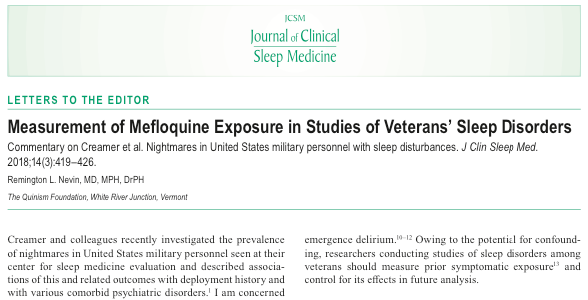
Dr. Nevin’s latest letter has been published in the Journal of Clinical Sleep Medicine, discussing concerns that unmeasured symptomatic mefloquine exposure is resulting in significant and unrecognized confounding in military and veteran studies of sleep disorders, including sleep apnea and nightmare disorder. The foundation encourages all researchers conducting sleep studies in military and veteran populations to measure their subjects’ history of symptomatic mefloquine exposure to control for such confounding. The foundation recommends that clinicians and researchers utilize its two-question White River Mefloquine Instrument (WRMI-2) to screen patients and subjects for this exposure.
